How SuperPACs Have Made Politics More Democratic
Far from being deterimental, there is a case to be made that SuperPACs have actually expended democracy during this election cycle.
Ross Douthat argues that the advent of SuperPACs have made the Republican Primary far more democratic that it would have been if they didn’t exist:
With the Republican primary season winding down, it’s time to celebrate two heroes of participatory democracy, two champions of the ordinary voter, two men who did everything in their power to make the ballot box matter as much as the fundraising circuit.
I speak, of course, of Sheldon Adelson and Foster Friess.
(…)
But consider what would have happened without the rich cranks. Mitt Romney, who attracted far more big-money support overall than any of his rivals, would have probably followed up his near-win in Iowa and his victory in New Hampshire with an easy win in South Carolina, and the primary campaign would have been, to all intents and purposes, finished after that. Instead of having the Republican nomination decided by millions of voters nationwide, it would have been decided by the voters in just three states – and, of course, by Romney’s sturdy donor base.
An extended primary season, which has featured competitive races in dozens of states instead of just a few, hasn’t necessarily been good for the Republican Party’s general election prospects. But it has produced a far more small-d democratic outcome than the alternative universe where Adelson and Friess stayed on the sidelines and Romney wrapped things up early. Because of their donations, the frontrunner has had to confront actual voters day after day and week after week, in Wisconsin and Nevada and Alabama and everywhere in between. The results haven’t necessarily been pretty, but they’ve supplied a campaign — as the historian Gil Troy suggested last fall — whose “length and fury are proportional to the electorate’s size and the presidency’s importance.” If this is a subversion of the democratic process, it’s taking a pretty unusual form.
The example of Romney and his rivals suggests that forbidding big Adelson-style political donations doesn’t prevent rich people from influencing politics. It just gives an enormous advantage to candidates who can draw on the largest possible pool of rich people, and whose supporters are well-connected enough to “bundle” donations from an even larger population of donors. Whereas a campaign finance system in which it only takes a few rich supporters to make a candidate competitive is a system that may ultimately be more open, not less, to outsiders and insurgents and populists of all stripes.
Douthat has a good point here, I think. Without the SuperPAC money that aided him in Iowa, it’s difficult to conceive of a scenario where Rick Santorum would have been able to break through in the manner that he did and challenge Mitt Romney and Newt Gingrich for the title of Republican frontrunner. The same goes for Newt Gingrich in South Carolina. The fact that neither one of them has managed to unseat Romney at the top of the ticket isn’t an indictment of their respective SuperPACs so much as it is a reflection of the fact that, while the extra boost the SuperPACs provided them has helped them, there’s only so much it can do. For example, SuperPAC money cannot be spent on campaign administration, get-out-the-vote, or the other types of efforts that campaigns have relied on since time immemorial. Similarly, a SuperPAC cannot make up for the fact that both of these candidates only appeal to a limited segment of the GOP or that they tend to say things that make them sound like idiots. What it can do, what it did do for both Santorum and Gingrich, is give them the opportunity to limit to some extent the immense advantages that a well organized and well funded campaign like Romney’s has in an election like this. I don’t think that it’s an unfair thing to say that if the SuperPACs didn’t exist both Santorum and Gingrich would have been forced to withdraw from the race due to lack of funds shortly after Florida, just as Romney did in 2008.
Douthat continues:
The example of Romney and his rivals suggests that forbidding big Adelson-style political donations doesn’t prevent rich people from influencing politics. It just gives an enormous advantage to candidates who can draw on the largest possible pool of rich people, and whose supporters are well-connected enough to “bundle” donations from an even larger population of donors. Whereas a campaign finance system in which it only takes a few rich supporters to make a candidate competitive is a system that may ultimately be more open, not less, to outsiders and insurgents and populists of all stripes.
In this campaign, those outsiders were Gingrich and Santorum — the kind of candidates who give high-minded liberals heartburn. But if Jon Huntsman’s billionaire father had spent more money on his son’s candidacy, bien-pensant types might have a different perspective on the supposed dangers of “crankocracy.” And who knows — next time it might be a billionaire Democrat keeping a Howard Dean-style insurgent competitive against a pedestrian and compromised Democratic frontrunner, in which case some liberals will probably learn to love rich cranks.
Or imagine what might have happened if Jon Huntsman’s father and his friends had decided to more fully fund the SuperPAC that was supporting Huntsman’s insurgent campaign for President. As it was Huntsman Sr. gave only about $2,000,000 to the SuperPAC, most of which was spent in New Hampshire where Huntsman managed to pull off a strong, although not nearly strong enough, showing. If Huntsman had had a Shelly Adelson or Foster Fries backing him maybe he would have caught on sooner, maybe not but it would have been interesting to watch.
I noted back in January that there’s another example from history about how one rich person can have a profound impact on a political race in a positive way. Richard Cohen had noted in a column that Eugene McCarthy’s insurgent campaign in 1968 was funded largely by a small group of wealthy liberals fed up with the Johnson Administration’s Vietnam policies. McCarthy didn’t win, but he did manage to do well enough in the New Hampshire Primary that year to cause the President of the United States to announce that he was not going to be a candidate for re-election, thereby changing the course of history. In effect, McCarthy had the first SuperPAC, although in his case the donors were able to do far more on his behalf because there were no restrictions on donations to candidates at the time. If current FEC regulations had been in place back then and there were no SuperPACs, then McCarthy likely would have been an afterthought at best.
That isn’t to say we should go back to the world of 1968 where there were essentially no campaign finance laws. The Watergate episode taught us that this system was fatally flawed when put into the hands of the wrong people. That’s why some of the laws that were passed in the wake of Watergate were a good idea and, if anything, need to be beefed up. Specifically, disclosure of campaign donors and expenditures provides a level of transparency that is not at all unreasonable and these regulations have always been upheld by the Supreme Court. If anything, we now live in a world where the disclosure laws, which essentially require campaigns and PACs to disclose donors and expenditures on a quarterly basis, aren’t nearly transparent enough. As I noted in my January post, modern technology makes it possible to provide public access to this information on a far more frequent basis than every 90 days, especially since (as we’ve learned) 90 days is a lifetime in politics. There’s also a fairly good argument in favor of removing the limits on individual contributions, or at least vastly increasing those limits and adjusting them for inflation on an annual basis, as long as disclosure is far more instantaneous.
Getting back to SuperPACs, though, the one thing that our experience this year seems to be showing us is that the modern campaign finance system largely works to the advantage of candidates with wealthy supporters and access to bundlers who can garner lots of donations from lots of of people. In this cycle, that person is Mitt Romney. The SuperPACs have given Santorum and Gingrich some ability to erode the advantages that this gives to Romney, but not by much. If Adelson and Fries were able to donate more than just the paltry amount that the FEC allows an individual to donate, they’d have had a far greater impact on the race because the candidates could use that money directly for campaign operations as well as advertising.
That isn’t to say that SuperPACs are all good, of course. They too need to be required to make more frequent disclosures of the sources and destinations of their funds, for example. Additionally, we may well wake up after this campaign is over and determine that they were, on the whole, a bad thing because of the extent they create an environment where candidates can’t be held responsible for the attack ads against their opponents. The answer at that point, though, wouldn’t be to eliminate SuperPACs and go back to the way things were in 2008. The answer would be to reform existing campaign finance laws in the manner I outlined above. So far, however, I would submit that we’ve learned that SuperPACs are more of a positive than a negative.
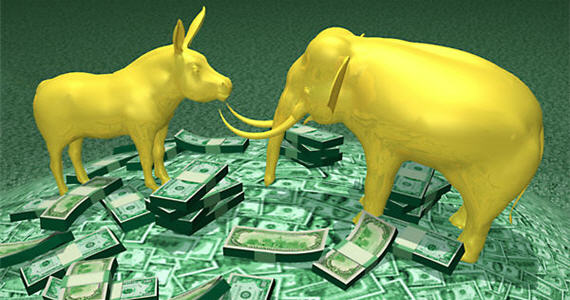

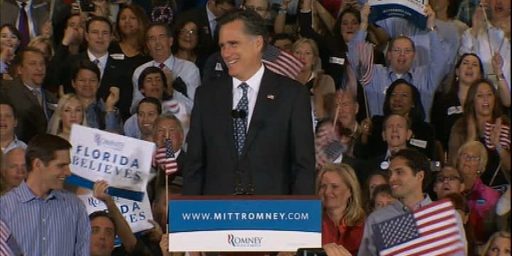
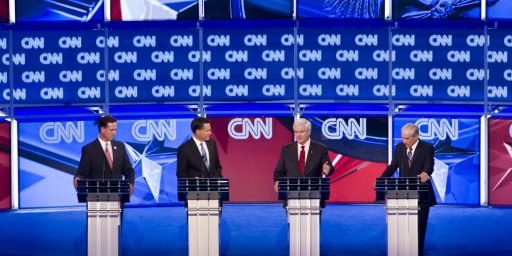
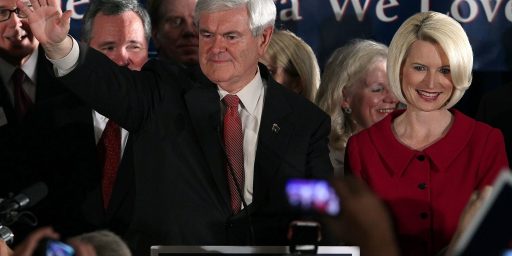
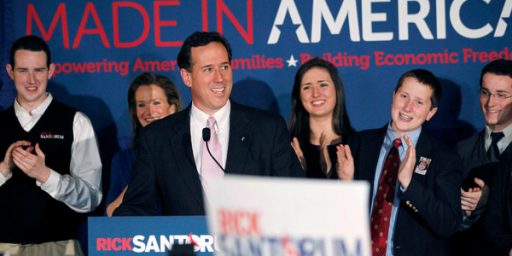

I don’t know about more democratic but those millions of bucks from mainly crankish billionaires have certainly enabled marginal candidates to stay in the race longer than they would otherwise have done. The US political process is so corrupted by money (as many have observed it really functions as a system of legalised bribery) it’s hard to know where you start in cleaning it up but certainly there should be total transparency when it comes to PAC donations.
Did I miss the part where you talk about Romney and his SuperPac outspending Santorumand his SuperPac 12:1 or whatever it was? Romney has bought the nomination. He outspent Santorum 7:1 in Michigan and barely won. Santorum wins Michigan and the race changes. Admittedly Romney may have…probably would have…done that regardless…but how is that Democratic by any stretch?
Regardless…let’s follow your point to it’s logical extension. Say Santorum, funded almost exclusively by Foster Freiss, managed to win the nomination and go on to win the Presidency. On January 21st, 2013 what obligations, expressed or implied, does Santorum have to Freiss? And how is that good for Democracy?
Romney reportedly has just a handful of major donors, and I have the same question about him. What has the Corporate Deal Maker promised his financiers?
Yes, it makes the system much more democratic for anyone with a billion dollars in their pocket. Of course, those are the only people that libertarians seem to give a damn about, so I can see why Doug likes this.
@Hey Norm:
That would be for the voters to decide. Which is why I favor full, complete, and immediate disclosure of donations and expenditures for campaigns, PACs, and SuperPACs.
On the whole, campaign finance laws have only served to reinforce the advantages of entrenched incumbency. And the people who think you can ever “get the money out of politics” are dreaming.
About as much as those who think you can ever substantially shrink government, particularly to the size that libertarians would like…
@Brummagem Joe:
Some would suggest it’s closer to extortion than bribery.
@Doug Mataconis:
Basically I agree with this. It’s too much part of the culture. Transparency is the only answer.
@ Doug…
I agree…the money is inevitable…but we need to make it completely and absolutely transparent.
It is odd that some who want smaller government don’t mind if the political process is flooded with money…surely they can see the connection between money and bigger government?
@Hey Norm:
I’d be highly in favor of eliminating the individual cap, which would effectively kill the SuperPAC’s if there was 100% disclosure and corporations or other organizations could not contribute to campaigns at all. If the board members of a corp want to exercise their free speech rights and donate to a campaign, then they are free to do so as individuals.
The problem with the system now is that people can hide by donating their money to a SuperPAC, PAC, Union, 501c, etc and you don’t have any real way of knowing who it is.
@An Interested Party:
Er….no
I can see the argument that the PACs increased “democracy” in this year’s primary, but I think that was coincidental and specific to this particular race, and not applicable as a general rule. Next time around, the PAC money might just as easily crush early challengers and end the primary in New Hampshire.
Douthat did not speak about the candidates he could not see, the little guys who did not benefit from rich friends, families, or PACs.
And somewhat unselfconsciously, he uses Huntsman as an example of how to get more of a voice, by spending more of the family millions.
All in all, he squints at a big money race and picks “good news” about big money spent. Ah well, that’s what Douthat is paid to do.
The “bigger government” was for people like Doug who complain so much about it…but what about a government that is beholden to the special interests that provide all the money to help politicians get elected…
@Doug Mataconis:
That’s a completely reasonable caveat, Doug. The problem is that such disclosure doesn’t exist. In its absence, unlimited-donation superPACs are objectively bad for democracy and any sort of “one person-one vote” society. But that doesn’t appear to be enough to get you to disapprove of the concept…
It’s “more democratic” in the sense that anyone who can attract the favor of a billionaire can make a credible run. Which means that every viable candidate will be one who prioritizes the needs and desires of billionaires.
In a libertarian paradise, I suppose this is considered democracy — after all, the Galtian producers are the only ones who matter, so they’re the only ones whose needs should be addressed. In the real world, this is a surefire way to turn the USA into a large economy sized version of 1980s El Salvador.
I’d be okay with much looser campaign finance laws, if it came with a Complete Disclosure requirement.
This article is ridiculous. First, as has been stated several times now… The author completely ignores how Romney’s SuperPac dropped negative ad bombs all across the country (especially Iowa, Florida, and Michigan), a campaign that heavily influenced public opinion/ voting in those states. Second… The author claims that, in the post-Citizen’s United era, democracy has been increased as a result of Super Pacs, using only one primary season as evidence. Last time I checked, a sample size of one doesn’t make something statistically significant. It’s pretty obvious that there are a lot of variables in an election, and SuperPacs don’t have a direct causal relationship with a long election cycle and thus “democracy”. Even his definition of democracy is jaded, considering that it’s predominantly the elderly, Christian conservatives, and values voters that participate in primaries anyway. But hey, let’s all applaud these patriotic billionaires for cementing the pillars of our democracy, since the rest of America kept bastardizing and ruining the system.
Boy that turned into a rant at the end there…
: your Freudian slip is showing.
It’s so damned convenient.
One stop shopping – regular people need not donate to campaigns at all. Just let every candidate get their own multi-billionaire sugar-daddy benefactor (or maybe two) and you’re set for a nice high-spending primary campaign and election season.
I could not agree more. There should be complete disclosure of all donors and donation amounts to every PAC, and I think it should all be disclosed and posted to an FEC website within 14 days. I would also prohibit donations to a PAC within 14 days of the final election in order to ensure that final donations could be disclosed prior to the election.
I don’t know, this whole argument sounds so arbitrary. Let’s say I shoot randomly into a crowded restaurant. I happen to strike and kill somebody. It turns out it’s a bad guy. So how can we say it’s a bad thing to shoot randomly into a crowded restaurant?
The fact remains, the rich always tended to win. Santorum’s rich backers won in the states they targeted, and Romney won most of the rest because he spent more.